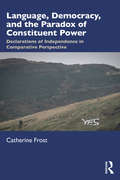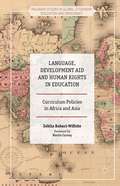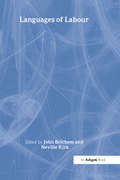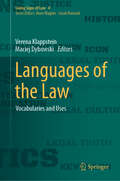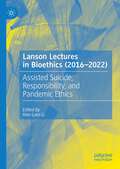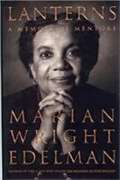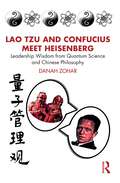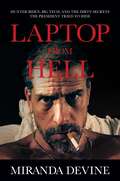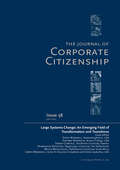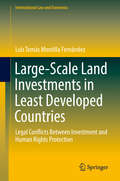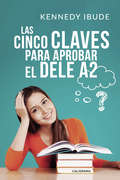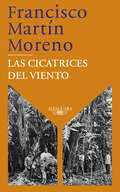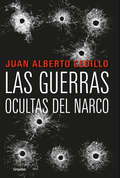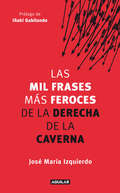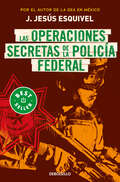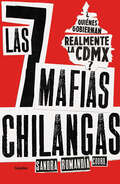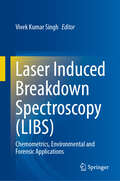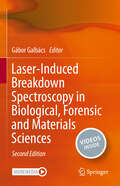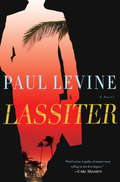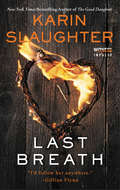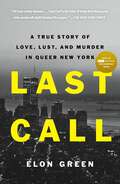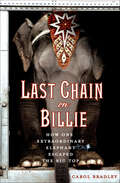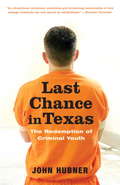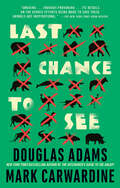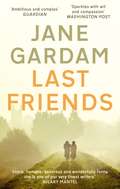- Table View
- List View
Language, Democracy, and the Paradox of Constituent Power: Declarations of Independence in Comparative Perspective
by Catherine FrostIn this book, Catherine Frost uses evidence and case studies to offer a re-examination of declarations of independence and the language that comprises such documents. Considered as a quintessential form of founding speech in the modern era, declarations of independence are however poorly understood as a form of expression, and no one can completely account for how they work. Beginning with the founding speech in the American Declaration, Frost uses insights drawn from unexpected or unlikely forms of founding in cases like Ireland and Canada to reconsider the role of time and loss in how such speech is framed. She brings the discussion up to date by looking at recent debates in Scotland, where an undeclared declaration of independence overshadows contemporary politics. Drawing on the work of Hannah Arendt and using a contextualist, comparative theory method, Frost demonstrates that the capacity for renewal through speech arises in aspects of language that operate beyond conventional performativity. Language, Democracy, and the Paradox of Constituent Power is an excellent resource for researchers and students of political theory, democratic theory, law, constitutionalism, and political history.
Language, Development Aid and Human Rights in Education: Curriculum Policies In Africa And Asia (Palgrave Studies In Global Citizenship Education And Democracy Ser.)
by Zehlia Babaci-WilhiteThe debate about languages of instruction in Africa and Asia involves an analysis of both the historical thrust of national government and also development aid policies. Using case studies from Tanzania, Nigeria, South Africa, Rwanda, India, Bangladesh and Malaysia, Zehlia Babaci-Wilhite argues that the colonial legacy is perpetuated when global languages are promoted in education. The use of local languages in instruction not only offers an effective means to contextualize the curriculum and improve student comprehension, but also to achieve quality education and rights in education.
Languages of Labour
by Neville Kirk John BelchemThis volume offers a multidisciplinary approach to the study of language in relation to the subject of history. The British and American contributors put forward the idea that language is a broadly based means of communication with contested and consensual meanings, and that such meanings must be revealed and evaluated by precise historical contextualisation of language and proper attention to established rules of historical method. The essays contend that the connections between the linguistic and the social must be rethought. The book aims to move beyond the unproductive fragmentation and relativism, the narrow textual range and the literal and anti-realist readings of the postmodern ’linguistic turn’ to offer a rigorous approach to the study of language and the subject of history.
Languages of the Law: Vocabularies and Uses (Living Signs of Law #4)
by Verena Klappstein Maciej DybowskiLaw can be seen as a motley of different languages deployed in the legal domain. The authors of the chapters share interest in what determines the scope of the vocabulary of these languages as well as in the way they are used. Thus, both the linguistic and pragmatic turns occurring in the philosophy of language are explored as exercising not mere ripple effects on legal scholarship, but rather as having a huge impact on jurisprudence. The chapters in this volume tackle three broad problem areas to offer a coherent picture of languages of the law. The first section is devoted to legal language at large, including reflections on its nature and some distinct functions it performs in the legal domain. The second section of the book focuses on the distinctly legal and pragmatic dimensions of some fragments of vocabulary, used either in legal texts or in legal scholarship. In the third section of the volume, authors research specific questions regarding legal language and legal reasoning.
Lanson Lectures in Bioethics (2016-2022): Assisted Suicide, Responsibility, and Pandemic Ethics
by Hon-Lam LiBioethical issues are practically urgent, politically divisive, and call for resolutions. They often involve questions that are perplexing, deep, and profound. To deal with them adequately requires philosophical tools and imagination. The Lanson Lectures in Bioethics were founded upon the belief that philosophical elucidation can clarify the nature of these difficult issues, and can lead to their resolution. The present volume collects the first five lectures delivered by five preeminent moral philosophers between 2016 and 2022. In the inaugural lecture, Jonathan Glover draws a distinction between two conceptions of dignity, and brings it to bear on the issues of assisted suicide, embryo research, and genetic choices. F. M. Kamm argues that doctors are morally permitted to intentionally cause death, or assist in its being intentionally caused, when either death is imminent anyway and intentionally causing it can alone stop the pain, or if the patient has already decided—not unreasonably—that death is his least bad option. Are smokers who contract lung cancer entitled to state-supported healthcare? T. M. Scanlon argues that the reasons that individuals have for wanting to have the opportunity to engage in activities involving risks need to be compared with the costs society has to bear to provide healthcare for those who suffer illness or injury as a result of these activities. Rejecting Strawson’s view that a psychiatrist can only “treat” an insane patient, Victor Tadros argues that it is often right to reason with (nonresponsible) mentally ill persons because a psychiatrist needs to see things from their perspectives, and that we should communicate to nonresponsible agents that their wrongdoing is a problem for them and for their victims. Peter Singer proposes solutions to the following questions: How to distribute scarce medical resources and vaccines ethically? Whether to relax the standard for volunteers willing to participate in vaccines research? How to compare the trade-off between saving lives and saving the economy regarding lockdowns? How to prevent pandemics in future?Each lecture is followed by a critical commentary by a moral philosophers or physician in Asia. Each commentary (except the inaugural lecture) is followed by a rejoinder.
Lanterns: A Memoir of Mentors
by Marian Wright EdelmanMemoir by founder of the Children's Defense Fund with portraits of the many mentors who helped shape her.
Lao Tzu and Confucius Meet Heisenberg: Leadership Wisdom from Quantum Science and Chinese Philosophy
by Danah ZoharThis highly original book offers a new philosophy and vision of higher purpose for leaders facing the immense challenges of the 21st century. By exploring Western quantum physics and traditional Chinese thought, leading management thinker Danah Zohar develops an emergent, new East/West vision that leads not just to global co-operation but to an exciting and revolutionary global-co-creativity.Taking complex ideas and presenting these in a highly engaging and readable way, this book offers the most recent thinking of Danah Zohar's quantum management theory. It demonstrates how the roots of this new philosophy and sense of higher purpose are both ancient and modern, drawn from traditional Chinese thought that had its beginnings thousands of years ago and from quantum physics, first discovered at the beginning of the 20th century. The new generation of quantum management is characterised by being more holistic, dynamic, and humanistic. Written in a very accessible way, Danah vividly demonstrates the advanced nature and scalability of quantum management by using real-world examples.This book provides a foundation for a new leadership vision and style, based on moral renewal, greater cross-cultural understanding, and global harmony, and is truly thought-provoking for business leaders and management researchers.
Laptop from Hell: Hunter Biden, Big Tech, and the Dirty Secrets the President Tried to Hide
by Miranda DevineAs seen on Tucker Carlson Tonight! The inside story of the laptop that exposed the president&’s dirtiest secret.When a drug-addled Hunter Biden abandoned his waterlogged computer at a Mac repair shop in Delaware in the spring of 2019, just six days before his father announced his candidacy for the United States presidency, it became the ticking time bomb in the shadows of Joe Biden&’s campaign. The dirty secrets contained in Hunter&’s laptop almost derailed his father&’s presidential campaign and ignited one of the greatest media coverups in American history. This is the unvarnished story of what&’s really inside the laptop and what China knows about the Bidens, by the New York Post journalist who brought it into the open. It exposes the coordinated censorship operation by Big Tech, the media establishment, and former intelligence operatives to stifle the New York Post&’s coverage, in a chilling exercise of raw political power three weeks before the 2020 election. A treasure trove of corporate documents, emails, text messages, photographs, and voice recordings, spanning a decade, the laptop provided the first evidence that President Joe Biden was involved in his son&’s ventures in China, Ukraine, and beyond, despite his repeated denials. This intimate insight into Hunter&’s dissolute lifestyle shows he was incapable of holding down a job, let alone being paid tens of millions of dollars in high-powered international business deals by foreign interests, unless he had something else of value to sell—which of course he did. He was the son of the vice president who would go on to become the leader of the free world.
Large Systems Change: A Special Theme Issue of The Journal of Corporate Citizenship (Issue 58)
Large Systems Change (LSC) is a field of study and action that is characterized by its focus on transformational pathways towards a participative, flourishing future through inter- and trans-disciplinary approaches that value engagement with practitioners and those aspiring for such futures. Its emergence holds great promise for addressing critical issues. Advancing its development requires aggressiveness to cross the many disciplinary, institutional and other boundaries and build the necessary scale of effort; however, humbleness is also required to recognize that although we have substantial knowledge and methodologies for approaching LSC, we are still at early stages of their development. The papers in this Special Issue of The Journal of Corporate Citizenship focus on the question of how to scale to the field of LSC. We can see the contributors and editors reflect on this at the three levels: broadening by increasing the numbers of people and organizations identified with it; going up and out with a more receptive environment arising with failures of traditional management approaches; and deepening of knowledge and methods for supporting LSC. This Special Issue will be essential reading for those researching in this emerging field, and practitioners looking for the latest thinking on how LSC may be a solution to global challenges.
Large-Scale Land Investments in Least Developed Countries: Legal Conflicts Between Investment and Human Rights Protection (International Law and Economics)
by Luis Tomás Montilla FernándezThis book analyses large-scale land investments for agricultural purposes in Africa’s least developed countries from a law and economics perspective. Focusing on the effects of foreign land investments on host countries’ local populations and the apparent failure of international law to create incentives to offset them, it also examines the legal and economic mechanisms to hold investors accountable in cases where their investment leads to human rights violations. Applying principal agent and contract theory, it elucidates the sources of opportunism and develops control mechanisms to ameliorate the negative effects. It shows that although judicial mechanisms fail to deliver justice, international law offers alternatives to safeguard against arbitrary and abusive state and investor conduct, and also to effectuate human rights and, thus, tackle opportunistic behaviour.
Las Cinco Claves para Aprobar el DELE A2
by Kennedy IbudeLas cinco claves para aprobar el DELE A2, examen. Las cinco (5) claves para aprobar el DELE A2, examen de nacionalidad. Un libro de nueva edición con mucha atención y revisado contundente. Es imprescindible para incrementar su nivel requerido; prepararte para aprobar el examen A2 está en tus manos.
Las cicatrices del viento
by Francisco Martín Moreno¿Por qué somos un continente rico de gente pobre? Dinero, sexo, golpes de Estado, sangre, amenazas y violencia desafiaron a congresos, jueces, presidentes y dictadores, que no resistieron la tentación de beneficiarse del gran negocio que les ofrecía el llamado Pulpo de la United Fruit. Un crudo relato sobre el ambicioso y sucio entramado forjado por Estados Unidos en los primeros años del siglo XX para apoderarse de la fuerza económica y política de países pobres, poblados por analfabetos, sin poderío militar ni estructuras democráticas, pero con territorios fértiles que incrementarían el poder económico de las incontrolables empresas transnacionales y del clero católico, sin importar la miseria y el atraso en el que sumían a todo un continente.
Las guerras ocultas del narco
by Juan Alberto CedilloHasta hoy, lo peor de la "guerra antinarco" ha permanecido casi en el silencio o en el terreno del rumor: el grado real de brutalidad, la lógica de los pactos, la crónica de las masacres, la explicación de los ataques... Mediante una investigación documental profundísima y un reporteo riguroso, Juan Alberto Cedillo ofrece una investigación inaudita que trae luz sobre estos fenómenos y aclara preguntas fundamentales de la lucha que desgarra, con saña particular, el norte de México. La base de estas historias son los propios testimonios de los capos, ofrecidos en México y Estados Unidos. Sus relatos explican una de las mayores heridas del país, al tiempo que desmontan algunos de los mitos más arraigados en torno al narcotráfico y los cárteles. "Gracias a que no serían juzgados por los asesinatos que cometieron en México, cuando los capos tuvieron la oportunidad de narrar sus andanzas, se explayaron al grado que los fiscales los tenían que callar..."
Las mil frases más feroces de la derecha de la caverna
by José María IzquierdoUn millar de las virulentas proclamas de la extrema derecha mediática que tan a menudo aparecen en los medios de comunicación. ¿Puede amparar el periodismo a aquellos profesionales que insultan, difaman o desprecian hasta el punto de desear el aniquilamiento de quienes no comparten su ideología? Los últimos acontecimientos políticos, económicos, sociales de la historia reciente de España -Zapatero, Rubalcaba, la crisis, el 15-M- deberían ser narrados e interpretados desde un foro de debate honesto y objetivo, que no se deje guiar por filias ni fobias. No obstante, algunos conocidos comunicadores de nuestro país han hecho de la desconsideración y el ataque despiadado sus armas de información. Las virulentas proclamas que a menudo escuchamos en la radio, televisión y leemos en la prensa ponen de manifiesto que el periodismo está enfermo, tal vez herido de muerte. El periodista José María Izquierdo, defensor del valor terapéutico de la denuncia en cualquier ámbito, también en el profesional, nos ofrece en Las mil frases más feroces de la derecha de la caverna un millar de ferocidades, una antología que pretende recoger sin juzgar el griterío de una de las zonas más densas de la extrema derecha mediática, esa que todavía habita en las cavernas. El único juez es el lector. Reseñas:«¿Hay sitio para aquel que en el uso de un medio de comunicación desprecia los datos e incluso los históricos con tal de conformar una opinión cuanto más agresiva mejor, es decir, peor?».Juan Cruz «Esta extrema derecha habita en los pliegues del PP, no en otro sitio. Fue el embrión del partido y ahora parece su herejía, pero continúa en el seno de su Iglesia. Ningún concilio la ha condenado ni ninguno de sus seguidores ha sido expulsado».Iñaki Gabilondo
Las operaciones secretas de la policía federal
by J. Jesús Esquivel¿CUÁL FUE EL PAPEL DE LA POLICÍA FEDERAL ANTES DE QUE SE INTEGRARA A LA GUARDIA NACIONAL? ¿CÓMO PARTICIPÓ EN ALGUNAS DE LAS OPERACIONES CONTRA EL CRIMEN MÁS RELEVANTES DE LOS ÚLTIMOS AÑOS? A nivel nacional e internacional, persiste la noción de que las instituciones policiacas de México son corruptas. Nada menos, en el léxico del trasiego de drogas la Policía Federal era sinónimo de operadores y peones de narcotraficantes. Las acciones de muchos agentes la desacreditaron, al grado de que muy pocos mexicanos confiaban en esta institución creada presuntamente para garantizar la seguridad nacional. Sin embargo, en su historial también existen misiones exitosas que concluyeron con la detención de importantes capos o la resolución de casos que llevaban tiempo sin ser atendidos. Basado en una sólida investigación documental, apoyada en expedientes, fotografías y múltiples entrevistas, J. Jesús Esquivel devela desde dentro 10 operaciones clave de la pf en la persecución criminal en México, como la captura del Chapo Guzmán en Los Mochis, el caso del asesinato de Marisela Escobedo, o el del hijo de Javier Sicilia, entre otras. Las operaciones secretas de la Policía Federal no es una apología de la institución ni de quienes la integraron, es un vistazo periodístico de casos en los que por la relevancia criminal o mediática de sus implicados no podía permitirse otro paso en falso en su ejecución.
Las siete mafias chilangas: ¿Quiénes realmente gobiernan realmente la CDMX?
by Sandra RomandiaLa vida cotidiana de los chilangos no está regida por las leyes. Está regida por las mafias. Día a día, lo sepan o no, los habitantes de la capital del país se someten a los dictados de mafiosos del agua, gangsters de los mercados, pandilleros del comercio, líderes de ambulantes, transportistas piratas, cárteles inmobiliarios, sindicatos tenebrosos y tratantes de personas… además de la delincuencia común. En la ciudad que alberga los poderes de la Unión, no se mueve una hoja sin que las mafias lo decidan. En esta obra, un grupo de periodistas de investigación analiza los siete flagelos a partir de los cuales se entiende el tamaño del problema. Van desentrañando, reportaje a reportaje, cómo es que el desastre actual del Metro -por ejemplo- sólo se explica a la luz de las facciones que se lo disputan; o cómo es que este pandemónium existe y se fortalece gracias al poder articulador del narcotráfico y la gigantesca y jugosa complicidad de las autoridades establecidas.
Laser Induced Breakdown Spectroscopy (LIBS): Chemometrics, Environmental and Forensic Applications
by Vivek Kumar SinghThis book provides a comprehensive overview of the latest applications of laser-induced breakdown spectroscopy (LIBS) in the environmental and forensic sciences along with chemometric methods. Environmental and forensic science increasingly requires multidisciplinary scientific methods, and LIBS has proven itself a more sensitive and user-friendly technology that can meet the demands of these fields. In addition, LIBS coupled with chemometric modeling approaches creates a powerful tool for detecting and quantitatively predicting the chemical composition of a variety of samples. As a result, this book consolidates essential developments in LIBS, data analysis using chemometrics, and breakthrough applications in environmental and forensic sciences. Beginning with an introduction of the principles of LIBS, the reader is then guided through field and sample-specific applications. An overview of LIBS-Raman instrumentation from basic to more advanced set-ups is also included. The analytical capabilities of the methods in terms of detection limits, accuracy, and precision of measurements for forensic and environmental samples is specifically covered. This book effectively translates the latest developments in algorithms for spectroscopic data and interpretation into these fields. Highlighting the utility of LIBS in environmental and forensic sciences, this book is an essential text for researchers well versed in the fields and as well as readers wanting to familiarize themselves with LIBS as a whole.
Laser-Induced Breakdown Spectroscopy in Biological, Forensic and Materials Sciences
by Gábor GalbácsThe 2nd edition of this book builds on the success of its predecessor, offering a comprehensive overview of recent advances and emerging applications in the area of laser-induced breakdown spectroscopy (LIBS). The new edition expands LIBS fundamentals and presents new case studies of applications to biological sciences. Readers will also find an updated perspective of LIBS applications to forensic and materials sciences. LIBS, which was previously mainly used by physicists, chemists and in the industry, has now become a very useful tool with great potential in these other fields as well. LIBS has a unique set of characteristics including minimal destructiveness, remote sensing capabilities, potential portability, extremely high information content, trace analytical sensitivity and high throughput. With its content divided into two main parts, this book provides not only an introduction to the analytical capabilities and methodology but also an overview of the results of recent applications in the above fields. The application-oriented, multidisciplinary approach of this work is also reflected in the diversity of the expert contributors. Topics added to this new edition include: Application of nanostructures in LIBS LIBS food analysis Cancer diagnostics using LIBS LIBS in nuclear and fusion research Microplastics detection using LIBS Tag-LIBS in biological applications Given its breadth, this book will appeal to students, researchers and professionals interested in solving analytical/diagnostic/material characterization tasks with the application of LIBS. Supplementary videos can be accessed online as well as directly from the print book; simply download the Springer Nature More Media App for free and scan the links with the play button.
Lassiter
by Paul LevineEighteen years ago, Jake Lassiter crossed paths with a teenage runaway who disappeared into South Florida's sex trade. Now he retraces her steps and runs head-on into a conspiracy of Miami's rich and powerful who would do anything to keep the past as dark as night and silent as the grave. In this tale of redemption and revenge, Edgar-nominated author Paul Levine delivers his most powerful thriller yet. Jake Lassiter, second-string linebacker turned low-rent lawyer, is cynical about the law, but if you hire him, he'll take a punch for you . . . and maybe a swing at the prosecutor, too.Amy Larkin--beautiful, angry, and mysterious--accuses Lassiter of involvement in the disappearance of her sister eighteen years earlier. What does Lassiter know about Krista Larkin, the runaway teen turned porn actress? More than he's saying. Seeking to atone for his own past, Lassiter follows the cold trail of the missing Krista and butts head with the powerful men who also knew her: a former porn king turned philanthropist, a slick Cuban-born prosecutor who'd love to be governor, and an aging mobster who once worked for the infamous Meyer Lansky. The evidence leads to a long-ago night of kinky sex, designer drugs--and possible murder. But before Lassiter can nail the truth, a gun goes off, a suspect falls dead, and Amy is charged with murder.The state has an eyewitness and a slam-dunk case. Lassiter has a client he doesn't trust and a case he can't win. Did Amy shoot the man who killed her sister? Or the wrong man? And what really happened to Krista? The answers, buried under years of deceit and corruption, are revealed in an explosive courtroom finale proving that rough justice is better than no justice at all.From the Hardcover edition.
Last Breath
by Karin SlaughterProtecting someone always comes at a cost.At the age of thirteen, Charlie Quinn’s childhood came to an abrupt and devastating end. Two men, with a grudge against her lawyer father, broke into her home—and after that shocking night, Charlie’s world was never the same.Now a lawyer herself, Charlie has made it her mission to defend those with no one else to turn to. So when Flora Faulkner, a motherless teen, begs for help, Charlie is reminded of her own past, and is powerless to say no.But honor-student Flora is in far deeper trouble than Charlie could ever have anticipated. Soon she must ask herself: How far should she go to protect her client? And can she truly believe everything she is being told?Razor-sharp and lightning-fast, this electrifying story from the #1 international bestselling author will leave you breathless. And be sure to read Karin Slaughter’s extraordinary new novel The Good Daughter—available August 22, 2017.
Last Call: A True Story of Love, Lust, and Murder in Queer New York
by Elon GreenA "terrific, harrowing, true-crime account of an elusive serial killer who preyed upon gay men in the 1990s." -The New York Times (Editor's Pick)"In this astonishing and powerful work of nonfiction, Green meticulously reports on a series of baffling and brutal crimes targeting gay men. It is an investigation filled with twists and turns, but this is much more than a compelling true crime story. Green has shed light on those whose lives for too long have been forgotten, and rescued an important part of American history."-David Grann, #1 New York Times bestselling author of Killers of the Flower MoonThe gripping true story, told here for the first time, of the Last Call Killer and the gay community of New York City that he preyed upon.The Townhouse Bar, midtown, July 1992: The piano player seems to know every song ever written, the crowd belts out the lyrics to their favorites, and a man standing nearby is drinking a Scotch and water. The man strikes the piano player as forgettable.He looks bland and inconspicuous. Not at all what you think a serial killer looks like. But that’s what he is, and tonight, he has his sights set on a gray haired man. He will not be his first victim.Nor will he be his last.The Last Call Killer preyed upon gay men in New York in the ‘80s and ‘90s and had all the hallmarks of the most notorious serial killers. Yet because of the sexuality of his victims, the skyhigh murder rates, and the AIDS epidemic, his murders have been almost entirely forgotten.This gripping true-crime narrative tells the story of the Last Call Killer and the decades-long chase to find him. And at the same time, it paints a portrait of his victims and a vibrant community navigating threat and resilience.
Last Chain on Billie: How One Extraordinary Elephant Escaped the Big Top
by Carol BradleyThe “powerful and haunting” biography of a star circus elephant who rebelled against her handlers and finally found freedom (Jane Goodall).Against the backdrop of a glittering but brutal circus world, Last Chain on Billie charts the history of elephants in America, the inspiring story of Tennessee’s Elephant Sanctuary, and the spellbinding tale of a resilient elephant who survived a decade of captivity.Left in the wild, Billie the elephant would have been free to wander the jungles of Asia with her family. Instead, traders captured her as a baby and shipped her to America, where circus trainers taught her to carry humans, stand on a tub and balance on one leg. For decades, Billie crisscrossed the country under miserable conditions—chained, beaten, and forced to perform stunts under harsh lights and blaring music.Finally, she got a lucky break. As part of the largest elephant rescue in American history, Billie wound up at a sanctuary for performing elephants in Tennessee. But, overcome with anxiety, she withdrew from the rest of the elephants and refused to let anyone remove a chain still clamped around her leg. Her caregivers began to wonder if Billie could ever escape her emotional wounds.
Last Chance in Texas: The Redemption of Criminal Youth
by John HubnerA powerful, bracing and deeply spiritual look at intensely, troubled youth, Last Chance in Texas gives a stirring account of the way one remarkable prison rehabilitates its inmates.While reporting on the juvenile court system, journalist John Hubner kept hearing about a facility in Texas that ran the most aggressive-and one of the most successful-treatment programs for violent young offenders in America. How was it possible, he wondered, that a state like Texas, famed for its hardcore attitude toward crime and punishment, could be leading the way in the rehabilitation of violent and troubled youth? Now Hubner shares the surprising answers he found over months of unprecedented access to the Giddings State School, home to "the worst of the worst": four hundred teenage lawbreakers convicted of crimes ranging from aggravated assault to murder. Hubner follows two of these youths-a boy and a girl-through harrowing group therapy sessions in which they, along with their fellow inmates, recount their crimes and the abuse they suffered as children. The key moment comes when the young offenders reenact these soul-shattering moments with other group members in cathartic outpourings of suffering and anger that lead, incredibly, to genuine remorse and the beginnings of true empathy . . . the first steps on the long road to redemption.Cutting through the political platitudes surrounding the controversial issue of juvenile justice, Hubner lays bare the complex ties between abuse and violence. By turns wrenching and uplifting, Last Chance in Texas tells a profoundly moving story about the children who grow up to inflict on others the violence that they themselves have suffered. It is a story of horror and heartbreak, yet ultimately full of hope.
Last Chance to See
by Douglas Adams Mark Carwardine"Very funny and moving...The glimpses of rare fauna seem to have enlarged [Adams'] thinking, enlivened his world; and so might the animals do for us all, if we were to help them live."THE WASHINGTON POST BOOK WORLDJoin bestselling author Douglas Adams and zooligist Mark Carwardine as they take off around the world in search of exotic, endangered creatures. Hilarious and poignant--as only Douglas Adams can be--LAST CHANCE TO SEE is an entertaining and arresting odyssey through the Earth's magnificent wildlife galaxy.From the Trade Paperback edition.
Last Friends: From the Orange Prize shortlisted author
by Jane Gardam'It's a cliche to compare novelists to Jane Austen, but in the case of Jane Gardam it happens to be true. Her diamond-like prose, her understanding of the human heart, her formal inventiveness and her sense of what it is to be alive - young, old, lonely, in love - never fades' Amanda Craig'Her work, like Sylvia Townsend Warner's, has that appealing combination of elegance, erudition and flinty wit' Patrick Gale'Sharp, humane, generous and wonderfully funny, she is one of our very finest writers' Hilary MantelShortlisted for the 2014 Folio Prize.Old Filth and The Man in the Wooden Hat told with bristling tenderness and black humour the stories of that Titan of the Hong Kong law courts, Old Filth QC, and his clever, misunderstood wife Betty. Last Friends, the final volume of this trilogy, picks up with Terence Veneering, Filth's great rival in work and - though it was never spoken of - in love. Veneering's were not the usual beginnings of an establishment silk: the son of a Russian acrobat marooned in northeast England and a devoted local girl, he escapes the war to emerge in the Far East as a man of panache, success and fame. But, always, at the stuffy English Bar he is treated with suspicion: where did this blond, louche, brilliant Slav come from? Veneering, Filth and their friends tell a tale of love, friendship, grace, the bittersweet experiences of a now-forgotten Empire and the disappointments and consolations of age.
